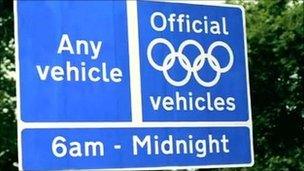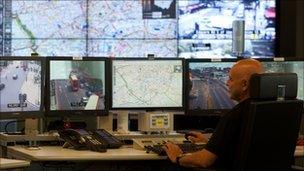London 2012: Inside Olympic transport command centre
- Published
Inside the London 2012 transport control centre
It is a phrase that is fast becoming synonymous with London traffic jams, tube delays and rail disruption: "If it's like this now, what's it going to be like during the Olympics?"
The Olympic Games will attract nine million spectators over 16 days, with the Paralympics drawing a further two million spectators over 11 days - all of whom are being asked to use public transport, walk or cycle.
It is Britain's largest peacetime logistical exercise, and as Transport for London's Surface Games Programme Director Graham Jones points out, the scale of the operation to keep traffic flowing is massive.
The Olympics is the equivalent of 26 world championships being held at the same time in 32 venues across the UK.
"If we ran them all in series instead of consecutively they would run over 436 days," says Mr Jones. "We're compressing them into 16 days."
Nerve centre
With much of the Games taking place in the capital, there are concerns about the ability of London's narrow streets and already near-capacity transport network to cope with the increase of traffic.

Many are worried about the impact the Olympic Route Network will have on London's traffic
Organisers hope all spectators will travel to events venues by public transport, and TfL has spent £6.5bn on extending lines and upgrading its network to keep London moving during the Games.
They also aim to reduce traffic in London by a third during London 2012 by persuading businesses to stagger working hours, external, plan delivery times, promote home-working and staff taking alternative routes into work.
Despite all the improvements, advice and warnings, external, TfL accepts that at the busiest times, there will be transport delays of more than an hour in certain areas. Urban government expert Professor Tony Travers of the London School of Economics says that, along with security, transport during the Olympics remains a "weak link".
"It will be hard for TfL to analyse all the factors," he told the BBC. "They can't do a hypothetical exercise, and will only find out how it works on the first day of the Olympics."
Organisers are keen to avoid a repeat of the 1996 Atlanta Games, which was marred by public transport problems.
"We want to make sure the Games are about sport, not transport," said Mr Jones.
He remains confident his team can keep the transport system running.
That team is based at a secret office in south London, where transport and police officials sit behind banks of screens and computers controlling London's traffic network.
The understated hum of the open-plan office belies its omniscient power: With access to 1,400 closed circuit television screens across the capital, officials can manually control half of the city's 6,000 traffic signals to divert vehicles away from blockages. A computerised system that measures traffic volume at 2,350 junctions adjusts signals to ensure a smooth flow.
By July, UK transport operators and agencies - rail, road, ports and aviation - will have representatives in the nerve centre, sharing the latest technology and information to identify and respond to incidents - whether they be a burst pipe or a security threat.
"If an incident happens on any part of the UK network that has an impact on the Games operations, that information is rapidly shared with other agencies so they can respond," said Mr Jones.
Public anger
For the nerve centre, the number one priority is ensuring athletes and officials reach their events in good time using the Olympic Route Network.

Games transport officials' top priority is ensuring athletes and officials reach their events in good time
This incorporates a 109-mile stretch of London roads, a third of which will include Games Lanes only accessible to 80,000 athletes, officials, sponsors - as well as emergency vehicles - who will mostly be shuttled around in a fleet of 1,500 coaches.
The ORN has sparked anger from businesses and residents who fear chaos because of traffic management measures which include the closure of side roads, banning turns, altering traffic light sequences, parking/loading suspensions, and suspending pedestrian crossings. Infringements will be punishable by a £200 fine.
The London Taxi Drivers Association - the biggest group representing black-cab drivers - says the restrictions will mean slower journeys, more traffic jams and frustrated passengers.
Having initially been promised they would be a central part of Games transportation, black-cab drivers now feel sidelined as they are not allowed to use Games Lanes, and have threatened to blockade London's streets if their concerns are not addressed.
Residents and businesses in areas such as Wapping - where the Highway runs along the spine of the ORN between the City and the Olympic Park - are just as concerned. Surrounded on three sides by the meandering Thames, locals say that if the Highway becomes congested, they will be stranded.
They complain that TfL have not taken the concerns of local people and businesses seriously, with poorly advertised drop-in centres and slow response to complaints.
LSE's Professor Travers said: "It would be easy to infer by the lateness of the consultation process that it has been left late in order to minimise the amount of opposition to the ORN when it is announced."
TfL disputes this, saying that after a period of informal consultation earlier this year, proposals were reviewed and changes made. And Mr Jones insisted that monthly meetings with the LTDA were now addressing the ORN proposals "junction by junction and road by road".
Even after the formal consultation period finishes next month and the proposals are sent to the transport secretary to become traffic regulation orders, the consultation process will continue, he added.
"If people have concerns, difficulties with access or deliveries, or are just unsure about what the ORN means for them, we need them to get in touch, external," said Mr Jones.
"Our main worry is that at Games time people don't think properly about how they're going to travel. If there's one piece of advice for everybody, whether a business, a spectator or a Londoner, it is to plan your journey carefully at Games time... don't go on auto pilot.
"There's a real danger that everybody says transport at London 2012 is going to be awful, but actually the Games are a huge opportunity for people."
- Published14 November 2011
- Published11 November 2011
- Published11 October 2011
- Published2 October 2011
- Published3 August 2011
- Published25 July 2011
- Published15 April 2011